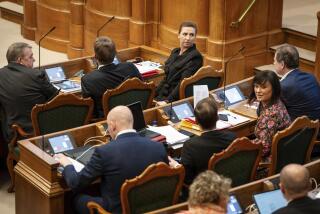Danes Vote to Accept Changes in Common Market Treaty
- Share via
COPENHAGEN — Danes voted Thursday to endorse changes in the European Communities previously rejected by their Parliament, and thus Denmark will remain a full member of the 12-nation organization.
About 75% of Denmark’s 4 million voters took part in a national referendum on a series of changes in the 1957 Treaty of Rome, the constitution of the Common Market. The changes were rejected six weeks ago by the Danish Parliament, but 56% of the people voting Thursday chose to support them.
The vote was a political victory for Conservative Prime Minister Poul Schlueter and the four-party coalition government he has headed since 1982.
For the opposition Social Democrats and former Prime Minister Anker Jorgensen, the vote was a severe setback. Jorgensen had taken the lead in the Parliament’s rejection of the treaty changes.
The referendum is expected to eliminate the European Communities as a political issue in Denmark. Danish membership has been a matter of contention since the nation voted to join in 1972.
Foreign Minister Uffe Ellemann-Jensen will fly to The Hague today to add Denmark’s approval to the treaty amendments, which are known as the European Act. Nine other members approved the act at a ceremony 10 days ago in Luxembourg. Italy and Greece have held back, waiting to see what Denmark would do.
There is now no doubt that the treaty changes, the first since it came into force, will be ratified, a process involving all the member parliaments. The changes are aimed at increasing the unity and efficiency of the European Communities and speeding development, by 1992, of a truly open Common Market, free of all trade barriers and restraints.
Also, the changes mean that most community decisions will be taken by the majority of those voting rather than unanimously, as at present, and the power of the European Parliament is to be increased. A small secretariat is to be established to facilitate political cooperation on foreign policy questions among the foreign ministries of member governments.
In Denmark, opponents of Danish involvement in European integration seized on all this as further infringement of Danish sovereignty.
More to Read
Sign up for Essential California
The most important California stories and recommendations in your inbox every morning.
You may occasionally receive promotional content from the Los Angeles Times.













